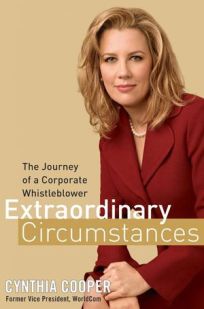Former WorldCom auditor Cynthia Cooper continues a conversation about the ethical downfall of the telecom giant in her new book, “Extraordinary Circumstances.”

What caused employees at WorldCom to become complicit with the fraud?
“Most people don’t wake up and say – I want to become a criminal today. Instead, they venture down a slippery slope one step at a time.
“Some of the mid-level managers felt pressured by superiors and were afraid of losing their jobs and having no way to support their families. They also began to rationalize their decision – it must be okay if their bosses told them to do it. I think the Controller felt a sense of misguided loyalty to the CFO. The CFO felt pressure to meet Wall Street earnings guidance and told himself that he was trying to save the company. Top level executives, who were accustomed to being praised on Wall Street, likely felt a sense of pride and didn’t want to see the company fail on their watch. Greed may have come in to play with executives who had substantial wealth at risk.”
Are companies any better, ethically, since WorldCom?
“The sub-prime crisis indicates that there is still a great deal of work to be done to protect the capital markets and promote transparency and ethical decision making.
“Many companies have made tremendous efforts, post Sarbanes-Oxley, to build and sustain ethical organizations. Internal Audit Departments are getting more support. External auditors have adjusted their audit methodologies so that they are more geared toward fraud detection. Boards are more independent. We’ll always have fraud, but I think the combination of many of these governance improvements will have a positive impact on promoting ethics as well as fraud prevention and detection.”
What would you like people to understand most after reading your book?
“Behind the accounts and numbers, this is a story about people and choices.
It is critical that we decipher not only the business lessons but the personal lessons. Any of us are capable of giving in to temptation and most of us can recall points in our lives when we felt pressured to do something that we didn’t think was right. That is why it is so important to draw clear ethical boundaries before we come to the crossroads of difficult ethical dilemmas and prepare ourselves and our children to stand up to pressure.”
How do we teach ethics to the next generation of business leaders?
“I think it is critical to incorporate ethics in the curriculum and start early, in elementary school. One of the most effective ways to teach ethics is through sharing real stories about people who have faced ethical dilemmas. Some people believe that you can’t teach someone to be ethical at the high school or college level. While it is true that many values are instilled at an early age, our character is not static. By bringing ethics to the forefront of a student’s thinking, we can better prepare them for the pressures they will face in the business world.
“I believe hearing a true story about real people who committed fraud, and the pressures they felt, brings ethics to life for young people. It encourages students to think about the ethical decisions they face every day in their own lives.
“Students often want to know what they should do if they identify wrongdoing or feel pressured to do something they don’t feel is right. That is why I have devoted the epilogue to steps young people can take to help recognize an ethical dilemma, stop, step back, think it through and make the right decision.
“We all face ethical dilemmas every day – whether to cheat, drink and drive, fudge an expense report or tax return. The foundation of our character is laid brick by brick, formed decision by decision throughout our lives. My challenge to students is to draw clear ethical boundaries and think about the decisions they make every day.”
What did you come away with from writing the book?
“I think that sharing the story with others has in many ways helped me to move forward. As I wrote and relived the story, there were times when I laughed and times when I cried. Living these events and writing about my experiences has caused me to reflect on my own priorities in life and what matters most as well as issues of justice, forgiveness, empathy and compasssion.”
Comments










